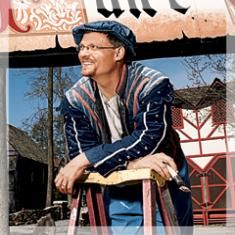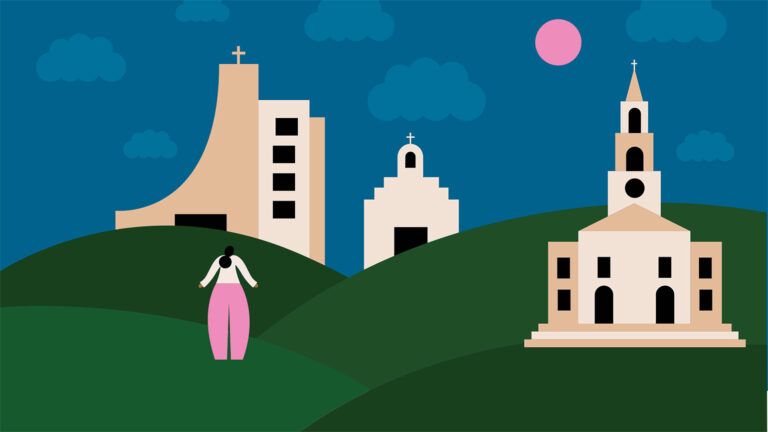I was blessed with three passions in life: history, teaching and religion.
I came from a faithful family of educators—Dad, my brother, both sisters. So to say that my professorship in history at Evangelical Theological Seminary in the rolling green hills of southeastern Pennsylvania was my dream job would be the understatement of a lifetime. It felt more like the familiar and assuring hand of the Lord guiding me on the path I’d been destined to follow.
Surely, then, you wouldn’t blame me for wondering how on earth I came to be dressed in tights, coarse tunic and feathered cap, uttering things like, “Hark, yon Dumpster is full!” while two actors dressed as medieval knights staged a sword fight over the rights to a fair maiden, herself a recently unemployed waitress.
But you would be just as surprised to discover how I learned that this job seems as much an answer to prayer as any job I’ve ever had, and in some ways more so.
Excuse me just a moment here while I change yonder lightbulb at the ticket booth to our Pennsylvania Renaissance Faire. We’ve got to see to be able to collect the ducats at the entry gate. There.
What got me to this place in life was a shocker of a conversation I had several months before with the dean of faculty in his quiet, wood-paneled office, the walls lined with book after revered book. I thought we’d be discussing my curriculum proposal for the upcoming semester. In fact, I launched right into it.
The dean stopped me. “James, you understand the financial challenges that this seminary faces. It’s dire. We have to make moves no one really wants to make. Yet make them we must. As of July first your full-time position will be eliminated.”
Shock stretches time. I felt like I sat there for hours in dead silence, but it was only a couple of minutes. I’d been a professor for 10 terrific years. My family was just about to move into a new house. Losing your job, they say, is second only to the trauma of losing a loved one. To me, it felt like attending my own funeral.
“James, you were a good teacher, and the faculty and students all loved you; it’s just that…” It sounded so eulogistic, like I was being lowered into my professional grave. The economy was bad. Schools were hurting. If I couldn’t hang on to the job I was perfect for, what prospects did I have?
That night I sat with my wife at the kitchen table. Lore had recently been let go from her job as a receptionist. In a very short time we had gone from being a two-income family with two kids to a no-income family and a new house to pay for.
“Why would God take away the job he led me to?” I asked.
Lore just shook her head and reached for my hand. “We don’t always know his full plan for us,” she said. Still, I could see the deep worry in her eyes.
Bills piled up. Our savings dipped rapidly. It felt like we were being sucked into some terrible financial black hole, the gravity of our obligations so much greater than our strength to meet them. I was scheduled to give a paper at an international conference of C. S. Lewis scholars. How could I afford to do that?
Now that school was out, all four of us were on the job hunt—Lore, our 16-year-old-son, Tyler, and Heather, our 19-year-old. We were willing to take just about anything. I’d worked construction in grad school—and enjoyed it—but nobody was building in this economy.
One morning I drove Tyler to apply for a summer job at the Pennsylvania Renaissance Faire—a touristy re-creation of a sixteenth-century English village with all the employees in period costume and character.
Tyler was psyched. He’d caught the acting bug at school that year. “This could be really cool, Dad.”
I sat in a room full of applicants while Tyler went in for his interview. By now it felt so dismally routine. Folks hunched over forms, checking their crib sheets of references and former employers.
I stared out the window hoping for some relief. I’d filled out so many job applications I didn’t think I could bear to look at another one. I focused on the mock Elizabethan architecture of the village.
Humph, the historian in me thought, then grudgingly admitted, Not bad. I looked some more. For the first time since I lost my job I felt something come alive inside me—a sense of familiarity.
For an historian the past feels familiar, sometimes even more so than the present. Here was an attempt to bring history into the present. It wasn’t a college, but it was a place people learned about the past, about their heritage, a kind of classroom in its own right.
I had another sense of familiarity as well—that assuring hand leading me.
I filled out an application and saw an interviewer. “I could be a greeter,” I offered. I’d already decided that would be the perfect fit for me. She glanced at my application again, probably noted that I was married and had lost a good job.
“There’s better money in maintenance,” she said.
It took me just an instant to consider the fact that I would be a maintenance man decked out in a period costume spouting quasi-authentic middle-English verbiage whilst wielding-eth a broom and dustpan. And I wouldn’t be making anything near what I used to make or be called professor.
Again that shock-induced slowing of time. The interviewer sat with her pen poised above my application. I felt my head start to nod. It was only for a couple months. All right, Lord. This must be where you want me right now.
“When do I start?” I asked.
The couple of days before I started at the Faire I spent painting the bedrooms of our new house. There was a therapeutic comfort in the smooth application of the paint, the soft swish of the roller as it transformed bare walls.
What do we really learn from history? I wondered. Why was I so comfortable with it? Teaching it? The future was unknown and unknowable, therefore unteachable. Or was it? Of all the knowledge I’d gained, I asked myself, what was the most essential?
Faith.
Faith connects the past to the future, like a kind of spiritual gravity. What I knew—knew with the utter certainty of anything I’d ever known—is that God is in the future as fully as he was in the past or in the present, in the moment and the smallest division of the moment, present in the very color of the paint I was putting on the walls.
God was everywhere in all of time and would be with me and my family today, tomorrow and forever. The greatest history lesson I could know was to trust him always, especially when faced with the unknowable.
That doesn’t mean my first day at the Faire was a total breeze. Who am I kidding? I caught myself thinking. I mean, you’d have to be a pretty amazing middle-aged guy not to be a little self-conscious parading around in public in tights and a feathered cap, sweeping up yonder hot dog wrapper.
The first time a little girl looked up at me quizzically—not unlike some students I’ve had—I doffed my cap, bowed and gave forth with a convincing, “Good morrow m’lady!” It felt good.
I took a lunch break with some of the actors. Pretty soon we were talking about Shakespeare, the Elizabethan theatre and the political intrigue of the times (then, not now). It wasn’t all that different from sitting in the faculty lounge.
Later, taking a coffee break, I watched the dancers perform. I mean, what job entertains you like that on your break?
Guess what? We all landed jobs at the Renaissance Faire that summer. Tyler was hired on as a maintenance man, Heather, a greeter and Lore took tickets. By the end of the season we were practically heartbroken that this amazing and magical time was over. Some of the workers would head south to join other Renaissance faires. But we would stay. Tyler and Heather were returning to school and Lore had a line on a promising job in town.
Oh, and me. I was offered a permanent position—at the Faire, maintaining the historic architecture year round, doing painting and carpentry and electrical work, work that I know and enjoy. I do a little teaching too. I picked up a couple of classes back at the seminary.
I try not to worry too much about the future—and I’m getting better at it. I’m comfortable knowing I’m meant to be where I am now. And where I’m led next, that will be the most interesting history lesson of all.






